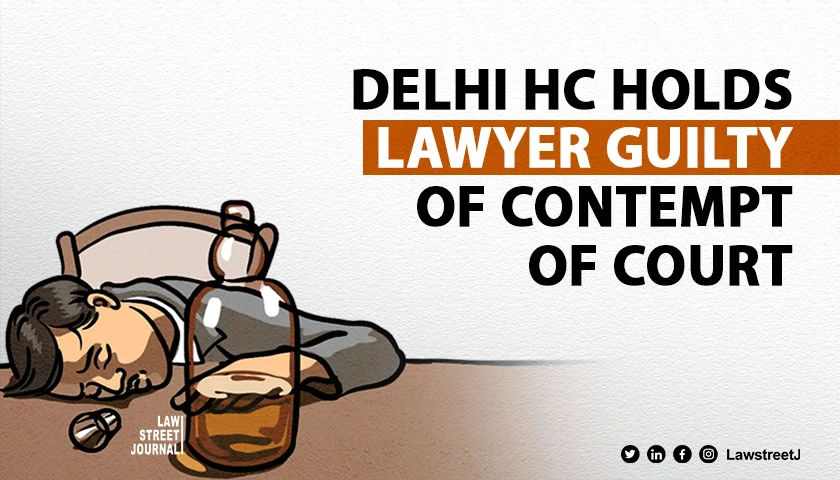New Delhi: The Delhi High Court has found a lawyer guilty of criminal contempt for using abusive language and appearing drunk before a female judicial officer, emphasizing that such conduct scandalizes the court and interferes with the administration of justice.
A Division Bench comprising Justices Prathiba M. Singh and Amit Sharma heard a suo moto contempt case against advocate Sanjay Rathod for his conduct in a traffic challan case on October 30, 2015.
The court noted that Rathod had shouted at the Metropolitan Magistrate, used filthy language, and appeared to be in a drunken state when his client’s traffic challan matter was adjourned.
Rejecting the contemnor’s argument that contempt proceedings were barred due to his criminal conviction, the court held:
“The jurisdiction of a court dealing with contempt is quite broad compared to the provisions of the IPC under which the contemnor can be prosecuted. It has also been held that since contempt itself is not punishable under the IPC and it is only other offenses that may be committed due to the conduct of the contemnor that are punishable, the bar would not apply.”
Regarding the contemptuous conduct, the court observed:
“A perusal of the language used by the respondent-contemnor against the judicial officer leaves no doubt that it falls within the definition of criminal contempt as defined under the Contempt of Courts Act. The language used by the contemnor has, in fact, scandalized the court, and such conduct also leads to interference in the administration of justice. The words spoken are foul and abusive.”
The court further emphasized:
“Moreover, considering that the presiding judicial officer was a female judicial officer and the manner in which the contemnor, i.e., the respondent herein, addressed her is completely unacceptable. Appearing before a court in a drunken state is also unpardonable. The same is contempt on the face of the court.”
While finding Rathod guilty of criminal contempt, the court did not impose additional punishment, noting that he had already served over five months’ imprisonment in the related criminal case. The court stated: “The period already undergone by the respondent herein is held as the punishment for the present criminal contempt.”
In conclusion, the Delhi High Court affirmed its power to punish for contempt of subordinate courts, found the lawyer’s conduct to be criminally contemptuous, but did not impose additional punishment given his prior imprisonment on related charges.







![Delhi High Court Sets Aside Arbitral Tribunal's Award Against NHAI in Highway Project Delay Case [Read Judgment]](/secure/uploads/2023/07/lj_9605_23374c2e-392c-4491-a2fe-f2f12fc5272f.jpg)
![Delhi Court Rejects Stay Request in Defamation Case Against Rajasthan CM Ashok Gehlot [Read Order]](/secure/uploads/2023/08/lj_5208_80de1ddc-d76a-4f7f-b180-408e3ae14fb4.jpg)





